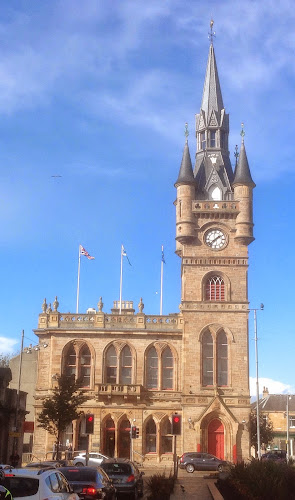I attended the Somerled and the Battle of Renfrew conference today, held in the fine setting of Renfrew Town Hall. For those not familiar with Scottish town halls, many were built in the baronial style, and Renfrew is a particularly fine example.
My particular interest in this local battle goes back to a GDWS display game in 2011, Somerled's Last Stand.
Somerled, King of Argyll and Lord of the Isles died at the Battle of Renfrew otherwise called, Bargarran, Knock or Inchinnan in 1164. His Islesmen, Manx and Irish allies were defeated by a Norman/Scots army led by the High Steward, Walter Fitz-Alan. We actually know very little about the battle or the forces involved, so the game was somewhat conjectural.
The first session by Ted Cowan gave us some background to the period and, for me at least, confirmation that we have very few sources. Then Denis Rixson reviewed the evidence of the West Highland galleys that were an essential element of the armed forces of the isles. Birlinns were smaller versions of the classic Viking longship, more suited to the economy and warfare of the isles. He has a new book out on the subject.
The main primary source for the battle is a later poem, 'The Song of the Death of Somerled and the Sacking of Glasgow'. Dr Alex Woolf has a paper analysing the poem and what little it tells us about the battle.
In the lunch break we had an excellent original musical interlude from the Renfrewshire Youth Music Initiative. A haunting tune that beautifully captures the battle.
In the afternoon David Caldwell talked about Somerled and the Lordship of the Isles. Again, we have limited sources. It is likely that he came from Ireland in about 1130 to lead a brilliant campaign to recapture Argyll from the Norse and eventually became King of Argyll. David outlined the likely strongpoints and administrative structures.
Derek Alexander gave us an archeologists perspective with a description of what the area looked like in the 12C and an overview of the key players. The favourite site is on the Knock, Kemp Howe in Moor Park housing estate, but no real hard evidence. What we do know is that the victory enabled the Steward's to expand across the west of Scotland.
Really interesting day, pulling together what little we know about a little known battle that had important consequences for the development of Scotland.


Sounds really interesting - a pity it was not publicised a bit more widely as I would gave liked to attend but had not heard that it was on
ReplyDeleteI missed the publicity as well, except a past GDWS chair is active on the local history and archeology circuit and he leaves flyers at the club.
ReplyDelete